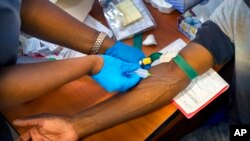The World Health Organization says the Oxford - AstraZeneca coronavirus vaccine can save lives and recommends using it even in African countries, where variant strains of COVID-19 are circulating. The WHO reports 3.7 million coronavirus infections, including nearly 100,000 deaths.
Since the first case of COVID-19 was identified in Africa nearly one year ago, the coronavirus, which causes the disease, has mutated. The continent now is faced with variant strains that are more dangerous and deadly.
The World Health Organization says eight countries have reported a highly contagious variant first found in South Africa, and six have seen another variant detected in Britain.
In the wake of the mutations, South Africa said this week it would suspend use of the AstraZeneca vaccine because it is not effective in preventing mild and moderate infections.
However, WHO Regional Director for Africa Matshidiso Moeti notes the vaccine appears to prevent severe cases of COVID-19 and hospitalization. Therefore, she says its use would be a great boon to Africa’s hospitals and health care systems, which are greatly overstretched.
“If cases remain mostly mild and moderate and do not require critical care than we can save many lives," said Moeti. "So, my message is to people, go out and get vaccinated when a vaccine becomes available in your country. Ensuring equitable access to COVID-19 vaccines and sustaining the public health measures are critical priorities to overcome this crisis.”
The South African government has said it will continue to use the AstraZeneca vaccine under trial conditions among older health care workers to get better data on its impact on more severe forms of the disease.
Meanwhile, Moeti says the international vaccine facility known as COVAX will begin a rollout of some 96 million doses of the AstraZeneca vaccine in Africa later this month.
Moeti says the WHO is contacting governments to inform them about the recommendations issued by agency experts for use of the AstraZeneca vaccine.
“An analysis of the risks and benefits with regard to using this vaccine needs to be made…particularly, to the neighboring countries to South Africa where the interaction is very intense, and we certainly know in several of those this variant is circulating," said Moeti. "We are, of course, supporting and advising all the countries in the region.”
Moeti also says the WHO was able to procure a small amount of Pfizer vaccine for distribution in four African countries. She says though the quantities are small, they will provide those countries with experience on how to use the vaccine.






